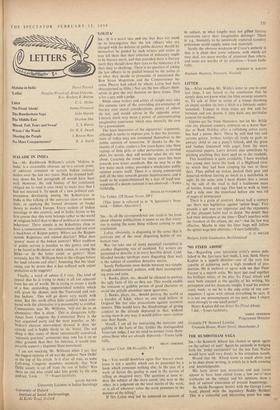LITTER
SIR,—After reading Mr. Wilde's letter to you in your last issue, I am forced to the conclusion that he simply does not know what the litter scourge amounts to. To talk of litter in terms of a tramp throwing an empty sardine tin into a ditch is a fantastic under- statement. Tramps in these times are few and far between and one doubts if they have any particular passion for sardines.
Gipsies are far from blameless, but let Mr. Wilde visit any pleasant country common on a warm Sun-' day or Bank Holiday after a rollicking urban party has had a picnic there. There he will find tins and cartons galore, broken bottles all ready to gash an unwary child or cut a pony's fetlock, and the grass and bushes festooned with pages from the more sensational papers. Lorry drivers also contribute by pitching anything they have used on to the roadside.
This beastliness is quite avoidable. I have watched two young men leave the hank of a Highland river by which they had been camping for two or three days. They pulled up stakes, packed their gear and departed without leaving as much as a matchstick in sight. In the same area I have drawn into a recess by the side of the road to find a loathsome mass of bottles, bones and rags. One had to walk at least half a mile over the moorland before one was rid of pages of newspapers There is a grain of comfort. About half a century ago there was legislation against 'spitter bogs.' Five pounds a spit was too expensive and the exponents of this pleasant habit had to desist. No doubt they had their defenders at the time—'Don't interfere with the freedom of the citizen, etc. etc.'—but the law was effective. Maybe in time the litter hogs will follow the spitter hogs into oblivion.—Yours faithfully,






































 Previous page
Previous page